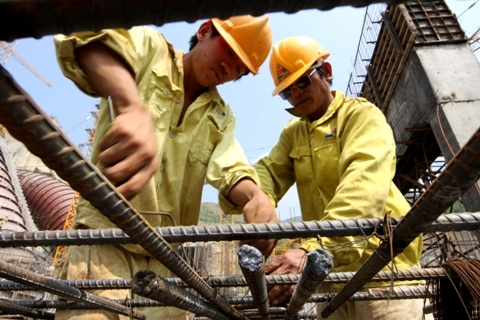|
Policy making on
“euphoric effect”
VietNamNet Bridge - According to economic
experts, the current recession though not being recognized by any official
document, comes to people everywhere. Some even said that we are falling into
the "euphoric effect," even in the policymaking process.

Dr. Le Dang Doanh: "Both judged
and be judge" institution
The major problem of the Vietnamese economy at present,
as the Americans say is “Elephant in the room.” One of the
"elephants" in
The next is the bankruptcy of private enterprises and
bad debts of the estate firms. And the "causes of the causes" are
the institution.
About the prospects for 2013, I do not share the
optimistic forecast. I think the economic situation will remain difficult.
Besides the improvement in the short-term, how will the long-term fundamental
problems to be solved?
How to handle the $67 billion debts? In such as the
situation of the banking system and bad debts, whether the asset management
company with VND500 billion of capital can resolve the debts of VND500
trillion, and for how long?
Now we have the "great" mechanism of issuing
special bonds, then the state bank will buy back the bonds to clean the
books. But after five years, if it is not resolved, the bank will have to
sell the bonds. This technique to clean the books is great, but it only works
in the short term, not long term.
... And finally, the cause of causes, is the
institutional issue. If it is not solved, are these problems settled?
Dr. Le Xuan Nghia: Falling into the
"euphoric effect"
There are some major issues to consider, but first and
foremost is the bad debts.
We should not use the word handling NPLs
(non-performing loans) anymore, but credit ice breaking or restoring
aggregate demand.
The
We need to look at the overall, as research of the
model of the VAMC asset management company, and using other solutions such as
direct recapitalization from the central bank, or use the state budget to
solve debts of the SOE sector, encouraging foreign investment in
Secondly, it is the foreign investment in
It's like some people in
Likewise, our government thanks to direct foreign
investment in offices and land rent, etc... which helped strengthening the
domestic market, to make
If reviewing the strategy of the Party Congress and the
resolutions of the National Assembly of the last term, we will see that all
of the targets are set based on the "euphoria syndrome." That is
the mindset of the emerging bourgeoisie. That is illusory, subjective, and
setting out a strategic way but applying different tactics, with poor
discipline of the policy.
I think that the impact of FDI is very important. It
seems that the two waves of foreign investment helped pull the
In 1997, we were in the crisis and seemingly foreign
elements pulled us up. With this crisis, I feel that the FDI factor in 2012,
2013 is working to pull us up.
We need to study about this phenomenon and to assess
the real value of FDI in Vietnam, to know whether the key objectives of
foreign investment has been achieved and what should we do to attract, and
effectively use foreign investment.
Dr. Vu Viet Ngoan: “We need to
analyze the back side, or in other words -- the cost we have to pay for the
policies that are being implemented, focusing on two issues, exchange rate
policy and monetary policy.”
Currently the exchange rate policy is making positive
results: increasing macroeconomic stability, contributing to control
inflation and to increase the value of the
First, we must apply the high interest rates for the
Third, when the interest rates of the Vietnam dong is
high, stable exchange rate will lead to the change of foreign currency
structure, the currency structure. For example, the people, the credit institutions,
commercial banks can sell foreign currency to take the
We need to calculate the cost we have to pay to know
the benefits and the costs to determine whether we should continue
implementing the exchange rate stabilization policy or not. And if we
continue, what should we do to reduce side effects.
The second problem is the implementation of monetary
policy towards harmonization of the goals of controlling inflation and
gaining reasonable economic growth. Focusing much on short-term inflation
control will lead to consequences affecting growth, production and imbalance
of supply and demand for goods, causing deflation due to lack of goods.
Therefore it is necessary to study the costs and
benefits of the policies to control inflation to determine whether to
continue that policy or relax it to some extent.
Dr. Vo Dai Luoc: Serious situation,
under normal solutions
We need real assessment to have correct solutions.
Inflation in the first three months of this year going down and it is
considered a success. But the government actually did not have to do anything
to reduce inflation, which is mainly due to the decrease of total supply and
total demand.
…Or the bad debt solutions. Many people doubt whether
the establishment of the VAMC asset management company can handle bad debts.
Because in fact, to handle bad debts like
After analyzing all solutions, we can see that the
situation is serious but the solutions are even below normal levels.
The current recession is not recognized in any official
document but people everywhere are talking about. If we don’t truly identify
the actual situation, the solutions will not fit.
My Hoa
|
Chủ Nhật, 2 tháng 6, 2013
Đăng ký:
Đăng Nhận xét (Atom)
Không có nhận xét nào:
Đăng nhận xét